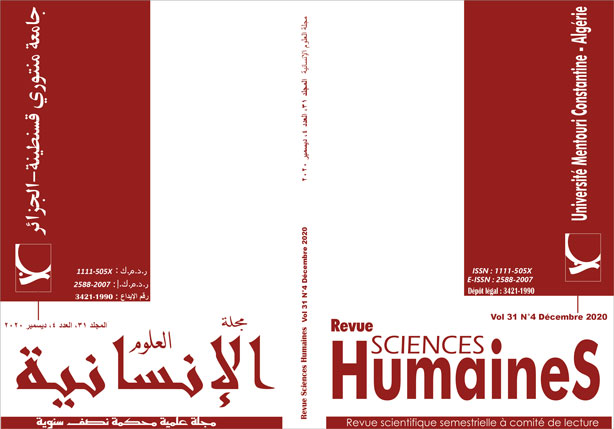Enhancing Students’ Motivation and Autonomy to Learn Online and Overcome Covid 19 Outbreak
Keywords:
Students’ autonomy, e learning, students’motivation, Covid 19 outbreakAbstract
The present study aims at motivating Algerian university students and fostering their autonomy to use e learning effectively to overcome Covid 19 outbreak. In this regard, three hypotheses were specified: First, it is hypothesised that if students have an inner motivation and a willingness to study they will surely succeed to overcome this pandemic situation and study in these bad and stressful conditions. Second, if students use different academic websites effectively, it would activate and promote their autonomy to learn beyond the classroom. Third, it has also been hypothesised that if English language learners develop a certain degree of autonomy, it would lead to e learning quality improvement. To verify such a premise, a questionnaire was sent to fifty teachers of English at University Constantine 1 to collect their point of view. The results show that students who are intrinsically motivated develop their autonomy and become effective successful e learner.
Downloads
References
Aronson, J. (2002). Improving Academic Achievement: impact of psychological factors on education. PhotoDisc, Inc. (p.64)
Benson, P. (2009). Making Sense of Autonomy in Language Learning. In R. Pemberton, S. Toogood & A. Barfield (Eds.), Maintaining control: Autonomy and language learning (pp. 13-26). Hong Kong: Hong Kong University Press. (P.14)
Benson, P. (2011). Teaching and Researching Autonomy in Language Learning (2nd ed.). Harlow: Longman. (Dickinson 1987 as cited in p. 14).
Boud, D. (1988). Moving Towards Autonomy. In D. Boud (Ed.), Developing Student
Autonomy in Learning (2nd ed.)(pp.17-39). London Candy (1987) cited in p. 21).
Brophy, J. (2004). Motivating students to learn (2nd ed). Mahwah, New Jersy: Lawrence Erlbaum Associates. ( p. 206)
Brophy, J. (2006). History of research on classroom management. In C. M. Evertson & C. S. Weinstein (Eds.), Handbook of classroom management: Research, practice, and contemporary issues (pp. 17-43). Mahwah, NJ: Lawrence Erlbaum Associates.
Dam, L. (1995). Learner Autonomy: From Theory to Classroom ¨Practice. Dublin: Authentik.
Dickinson, L. (1992). Learner Training for Language Learning. Dublin: Authentik. (p. 167)
Dörnyei, Z. (2001). Motivational Strategies in the Language Classroom. Cambridge: Cambridge University Press. (p. 120).
Farivar, A. ( 2015 ).The Impact of CALL on Iranian EFL Learners' Autonomy
Gough I, McGregor J. A, (2007). Wellbeing in Developing Countres: From Theory to Research Cambridge University Press P. 106
Higgs, J. (1988). Planning learning experiences to promote autonomous learning. In
D. Boud (Ed.) Developing student autonomy in learning (2nd ed.) (pp. 40-58).
New York: Nichols Publishing Company. (p.41)
Holec, H. (1981). Autonomy and Foreign Language Learning. Oxford: Pergamum. (First published in 1979), Strasbourg: Council of Europe. (p.3)
Jones, (2001) .Days and Nights on the Internet: The Impact of a Diffusing Technology
Jordan, A.et al (2008). Approaches to Learning: a guide for teachers. The Mc Graw-Hill. Open University Press. (Gagné and Medsker 1996. ; cited in Jordan et al., 2008, p.154).
Lamb, Tand Reinders , H (2008). (Learner and Teacher Autonomy: Concepts, Realities, and Responses. John Benjamin Publishing Company Sinclair (2008 cited in P.242).
Little, D. (1991). Learner Autonomy 1: Definitions, Issues and Problems. Dublin:
Authentik. (p. 4).
Little, D. (1995). Learner as Dialogue: The Dependence of Learner Autonomy on teacher Autonomy. System, 23 (2), 175-181. (p. 178)
Little, D. (2007). “Language Learner Autonomy: Some Fundamental Considerations Revisited”. Innovation in Language Learning and Teaching. 1.1, pp.14–29. ( p.16).
Mc Donough (1981). Psychology in Foreign Language Teaching. Harper Collins Publishers. (p.148)
Mckay,S; L and Hornberger,N.S. (1996). Sociolinguistics and LanguageTeaching.Combridge University Press (Gardner, (1985; cited in p.05)
Mitra, S. (2013). Build a School in the Cloud. In Ted Talk. Retrieved from www.ted.com/talks.
Oxford, R. (1990). Teaching and Researching Language Learning Strategies (2nd ed.). London: Routledge.
Oxford, R. (1999). Anxiety and the Language Learner: New Insights. In J. Arnold (Ed.), Affect in Language Learning (pp. 58-67). Cambridge, UK: Cambridge University Press. Rivers 1983 cited in p. 60)
Reeve, J., & Su, Y. (2014). Teacher Motivation. In M. Gagné (Ed.), The Oxford Handbook of Work Engagement, Motivation, and Self-determination Theory (pp. 349-362). Oxford: Oxford University Press. (pp. 354-356).
Reinders, H., & White, C. (2016). 20 Years of Autonomy and Technology: How far have we come and where to next? Language Learning & Technology, 20 (2), 143-154) (p. 144).
Ryan, R & Deci, E. (2000). Intrinsic and Extrinsic Motivations: Classic Definitions and New Directions Contemporary Educational Psychology 25, 54–67 (p. 54) , (p. 56)
Scharle, A & Szabo, A. (2000). Learner Autonomy: A Guide to Developing Learner Responsibility. Cambridge: Cambridge University Press. (p.4)
Sinclair, B. (1999). Survey Review: Recent Publications on Autonomy in Language Learning. ELT Journal, 53(4), 309-329.
Sinclair, B. (2008). Multiple voices: Negotiating pathways towards teacher and learner autonomy. In T. Lamb & H. Reinders (Eds.), Learner and teacher autonomy: Concepts, realities, and responses (pp. 237-266). USA: John Benjamins Publishing Company. Dam (1990 & 1995) cited in p.242-p. 243)
Slavin, R.E. (2003). Educational Psychology: theory and practice (7th Ed). Pearson Education, INC. ( p. 329) , (p. 292)
Slavin, R. E. (2006). Educational psychology: Theory and practice (8th ed.). Boston:Pearson Education . (p. 336)
Warschauer, M., & Healey, D. (1998). Computers and Language Learning: An Overview. Language Teaching, 31, 51-71. (p.65). http://dx.doi.org/10.1017/S0261444800012970
Williams, M and Burden, R. (1997). Psychology for language Teachers: a Social Constructivist Approach. Cambridge University press. , (p. 112)
Downloads
Published
How to Cite
Issue
Section
License

This work is licensed under a Creative Commons Attribution-NonCommercial-ShareAlike 4.0 International License.

















